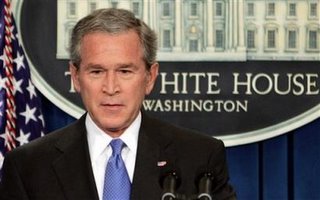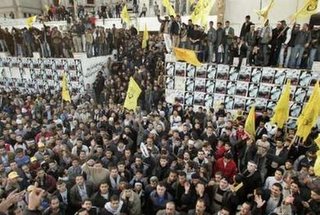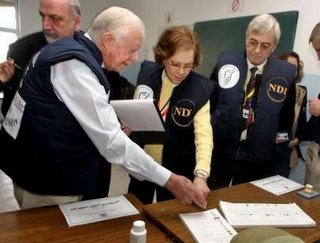This is another 2-story post. First story from
Yahoo News--Hamas Wins Landslide 76 Seats:RAMALLAH, West Bank - Hamas won a landslide victory in parliamentary elections as Palestinian voters rejected the longtime rule of the corruption-ridden
Fatah Party, according to nearly complete official returns Thursday. The triumph by the Islamic militant group plunged the future of Mideast peacemaking into turmoil.
Palestinian leaders, stunned by the militant group's sweeping victory, huddled to determine the shape of a new government as world leaders, including
President Bush, insisted Hamas renounce violence and recognize
Israel's right to exist.
Supporters of the two main parties briefly scuffled in Ramallah after Hamas supporters raised their party's green flag over the parliament. The two sides threw stones at each other, breaking windows in the building, as a small group of Fatah supporters tried to lower the banner. The crowd of about 3,000 Hamas backers cheered and whistled as activists on the roof raised the flag again.
Hamas won 76 seats in the 132-member parliament, while Fatah, which controlled Palestinian politics for four decades, won 43 seats, said Hanna Nasser, head of the Central Election commission. The 13 remaining seats went to several smaller parties and independents.
The result was based on a count of 95 percent of the vote and still could change slightly, Nasser said.
First, this is a real surprise. I will admit that I have not been keeping up with the Palestinian conflict here, except to say that the whole situation is a complete mess. From what history I've read on the subject, the Palestinians have been consistently given the short end of the stick. Once the Arab nations found out that they could not destroy Israel, over the last four wars (1948 War of Independence, the '56 Sini Campaign, the '67 Six Day War, and the Yom Kippur War), the Arab nations realized that Israel was there to stay. So, the Arab nations took up this Palestinian cause, not to help the Palestinians gain an independent state for themselves, but rather to use this cause as a means to further aid in the destruction of Israel. The territory for this state of Palestine would have to be carved up from the state of Israel--certainly not from any territory of the Arab states. The problem here is that the Palestinians decided to line up with the Arab states, bringing about this prolonged terror conflict, which created the PLO, Hamas, and many other radical groups. Interestingly enough,
UPI had a story saying that Israel started to support Hamas as a counter-weight to the PLO in the 1970s, certainly before Hamas shifted to its extreme militant ideology of today. So the Palestinians were used as pawns in this greater geopolitical game between greater powers in the Middle East.
In one sense, the Palestinians have themselves to blame. They ended up supporting a losing side in this geopolitical game of the last fifty years. The Arabs were certainly willing to provide money, weapons, and support for their cause. But that cause was molded to fit within the Arabs own overall strategy of destroying Israel--there was no negotiations, or compromise. And once the PLO started their own terror attacks against Israel, there was certainly no way for Israel to agree to negotiate with a known terrorist organization that was continually carrying out attacks on Israelis. There had to be a compromise--a middle ground between the PLO and Israel. We've seen some of that middle ground come about with the
1993 Oslo Accords, where Israel did sign an agreement with the PLO--each side recognizing the other, starting up the negotiations. But it wasn't enough to continue the peace process. I would say that both the Israelis and Palestinians--under the leadership of the PLO--never trusted each other to continue the process. In effect, the peace process may have been destroyed by not just 50 years of bad blood and revenge between the Israelis and Palestinians, but also generations of religious and ethnic hatred between the Judaism and Islam, between the Jews, the Arabs, and the Palestinians. It is going to take time to heal the wounds, time to slowly settle these conflicts, and to bring peace within the Middle East.
We've had some rapid developments going on the Middle East. The big one certainly was this victory by Hamas in the first Palestinian elections. I'd say this victory was an incredible first step in providing the Palestinians their own self-determination. The Palestinians basically threw out, what could be construed as the de facto PLO-government within the Palestinian Authority.
And Fatah became the dominant political force within the PLO. I"m not going into any details on this, since I'm not sure I understand it all. But I'd say that because of Fatah's dominance within the Palestinian politics, it became the primary political force which took control of the Palestinian Authority, its leaders moving from the politics inside of the PLO, to the politics of creating and running an autonomous territory. Corruption certainly would have set in. There really wasn't any democracy to be set up within this state yet, no way for the Palestinian people to vote for their own self-interests. During this transition period of the Palestinian Authority, Hamas also worked to transition itself from a radical Islamic terrorist group, to something of a political party within the Palestinian authority--in other words, Hamas started its own grass-roots campaign to win the hearts of the Palestinian people. Meanwhile, Fatah played "palace politics." After this election, the Palestinians threw out Fatah, and instituted Hamas within the government.
So what does the Bush White House has to say about this election? Consider this story from
Yahoo News:WASHINGTON - Stunned by Hamas' decisive election victory,
President Bush said Thursday the United States will not deal with the militant Palestinian group as long as it seeks Israel's destruction.
"If your platform is the destruction of Israel it means you're not a partner in peace," the president said. "And we're interested in peace." He urged Hamas to reverse course.
Hamas has taken responsibility for dozens of suicide attacks on Israel over the past five years but has largely observed a cease-fire since the election of Fatah leader Mahmoud Abbas as Palestinian president last year.
Bush left open the possibility of cutting off U.S. aid to the Palestinians. That was echoed by a nonbinding Senate resolution condemning Hamas and expressing support for halting assistance to the Palestinian government, of which the U.S. is providing $150 million for development this year.
Bush also called on Abbas, a U.S. ally, to remain in office despite Fatah's defeat by Hamas in parliamentary elections. Abbas, elected separately a year ago, said he was committed to negotiations with Israel and suggested talks would be conducted through the Palestine Liberation Organization, a possible way around a Hamas-led government.
"A political party that articulates the destruction of Israel as part of its platform is a party with which we will not deal," he said at a White House news conference. But he also said, "Peace is never dead because people want peace."
Not a very encouraging first sign from President Bush. The Palestinian people elected a government that is hostile to both Israel and the United States. As a result, President Bush cuts off any American aid to the Palestinian, while all but claiming that this new Hamas-controlled Palestinian government is a terrorist government. And the U.S. will not negotiate with terrorist governments. I'm sorry, but the Bush administration is acting with hypocrisy here--calling for Middle Eastern countries to embrace democracy. But when a new government is democratically elected, in the Middle East with the Palestinian Authority, that is against the interests of the U.S., the Bush administration has to go on the attack in criticizing this new government. Consider this statement by Bush:
"I made it very clear that the United States does not support political parties that want to destroy our ally Israel, and that people must renounce that part of their platform," Bush said.
Too many neocon hotheads in Washington, who can't seem to control their emotions here. Did it ever occur to anyone in the Bush White House, that the Hamas party is just as shocked that they could win so many seats in this election? That perhaps, they don't know what to expect or do, now that they are the dominant power within the Palestinian Authority. Tossing insulting criticisms and with holding aid is not the way to reinforce democratic ideals within this new government. A better response would have been that the U.S. would respect the right for the Palestinians to elect their representatives, and hope that this newly elected government is willing to work towards building a lasting peace, with all parties, within the Middle East. Leave it at that--no demands, condemnations, or concessions. Let Hamas take some time to settle into its new role as the dominant political party within the Palestinian Authority. If Hamas is willing to negotiate, then you start talking about the parameters for the negotiations--such as Hamas renouncing the destruction of Israel, and such. Let democracy work from within the Palestinian Authority, let the Palestinians decide what their policies should be--in other words, let them make the first move.
Unfortunately, the Bush administration didn't allow the Palestinians to make that first move.





























